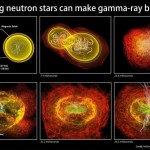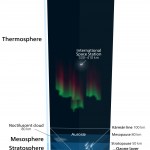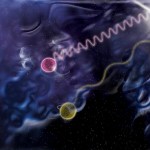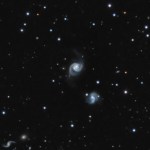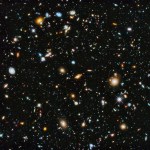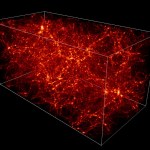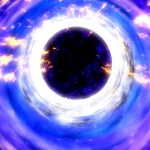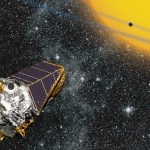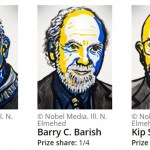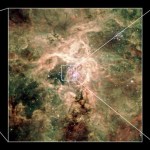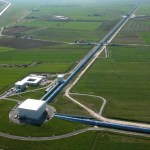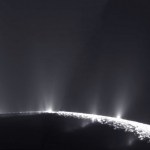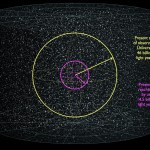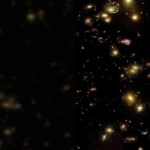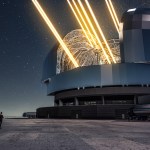Astronomy
“I am looking at the future with concern, but with good hope.” –Albert Schweitzer
Every so often, the argument comes up that science is expendable. That we’re simply investing too much of our resources — too much public money — into an endeavor with no short-term benefits. Meanwhile, there’s suffering of all kinds, from poverty to disease to war to natural disasters, plaguing humanity all across the country and our world. Yet even while there is suffering in the world, investing in our long-term future is indispensable. This story is nothing new.
To invest in any one thing means to not…
"O. Hahn and F. Strassmann have discovered a new type of nuclear reaction, the splitting into two smaller nuclei of the nuclei of uranium and thorium under neutron bombardment. Thus they demonstrated the production of nuclei of barium, lanthanum, strontium, yttrium, and, more recently, of xenon and caesium. It can be shown by simple considerations that this type of nuclear reaction may be described in an essentially classical way like the fission of a liquid drop, and that the fission products must fly apart with kinetic energies of the order of hundred million electron-volts each." -Lise…
"When we meet real tragedy in life, we can react in two ways - either by losing hope and falling into self-destructive habits, or by using the challenge to find our inner strength." -Dalai Lama
Orbiting at hundreds of miles above Earth’s atmosphere, you’d think the Hubble Space Telescope would be safe and stable for a long time. But despite our definitions, Earth’s atmosphere doesn’t “end” and space doesn’t “begin” when we get 60 miles (100 kilometers) up. Instead, Earth’s atmosphere continues, albeit tenuously, for incredible distances, until it eventually merges with the solar wind. It’s…
"This is going to have a bigger impact on science and human understanding, in many ways, than the first discovery of gravitational waves. We're going to be puzzling over the observations we've made with gravitational waves and with light for years to come." -Duncan Brown
Detecting black holes and the gravitational wave signals from them was an incredible feat, but doing the same thing for neutron star mergers is a true game-changer. Instead of fractions of a second, neutron star mergers show up for up to half a minute. Unlike black holes, there’s an electromagnetic counterpart. Because of…
"It’s becoming clear that in a sense the cosmos provides the only laboratory where sufficiently extreme conditions are ever achieved to test new ideas on particle physics. The energies in the Big Bang were far higher than we can ever achieve on Earth. So by looking at evidence for the Big Bang, and by studying things like neutron stars, we are in effect learning something about fundamental physics." -Martin Rees
When the Advanced LIGO detectors turned on in 2015, it shook up the world when they detected their first event: the merger of two quite massive black holes. Since that time, they’ve…
"Truth in science, however, is never final, and what is accepted as a fact today may be modified or even discarded tomorrow. Science has been greatly successful at explaining natural processes, and this has led not only to increased understanding of the universe but also to major improvements in technology and public health and welfare." -National Academy of Sciences
It’s no secret that peering out into the distant Universe is best done from space, just as looking at our entire world is best done from that same vantage point. For all of human history until the mid-20th century, this was an…
"There are stars leaving the Milky Way, and immense gas clouds falling into it. There are turbulent plasmas writhing with X- and gamma-rays and mighty stellar explosions. There are, perhaps, places which are outside our universe. The universe is vast and awesome, and for the first time we are becoming a part of it." -Carl Sagan
It’s no secret that if we look at the matter we see in the Universe, the story doesn’t add up. On all scales, from individual galaxies to pairs, groups and clusters of galaxies, all the way up to the large-scale structure of the Universe, the matter we see is…
"You were always a good officer. Until you weren't." -Saru, from Star Trek: Discovery
Science is full of great ideas and brilliant discoveries, and some of those more recent ones have made their way into the popular consciousness. TED talks, popular blogs and online magazines, and Facebook pages and internet memes have helped disseminate bits of knowledge to millions. But how much of what's come through is actually worth knowing, versus how much is simply science-sounding buzzwords that's content-free?
Outside the event horizon of a black hole, General Relativity and quantum field theory are…
"How vast those Orbs must be, and how inconsiderable this Earth, the Theatre upon which all our mighty Designs, all our Navigations, and all our Wars are transacted, is when compared to them." -Christiaan Huygens
With a field-of-view encompassing 150,000 stars, NASA’s Kepler mission delivered an overwhelming prize when it came to hunting worlds beyond our own Solar System: thousands of new exoplanets. The majority of them, however, were different from what we have at home. They were larger, more massive, closer to their parent stars, and orbiting more quickly than what we find in our own…
"Wormholes are a gravitational phenomena. Or imaginary gravitational phenomena, as the case may be." -Jonathan Nolan
Yes, we detected gravitational waves, directly, for the first time! Just days after Advanced LIGO first turned on, a signal of a 36 solar mass black hole merging with a 29 solar mass black hole gave us our first robust, direct detection of these long-sought waves, changing astronomy forever. Einstein’s General Relativity was validated in a whole new way, and over 40 years of work on developing and building LIGO was vindicated at last.
The inspiral and merger of the first pair…
"If I die trying but I’m inadequate to the task to make a course change in the evolution of this planet…okay I tried. The fact is I tried. How many people are not trying. If you knew that every breath you took could save hundreds of lives into the future had you walked down this path of knowledge, would you run down this path of knowledge as fast as you could." -Paul Stamets
When you look at the dark matter network of the Universe, what do you see? Do you see patterns similar to other networks, like neurons in your brain or the mycological mats found beneath the soil on Earth? Of course you…
"Look and think before opening the shutter. The heart and mind are the true lens of the camera." -Yousuf Karsh
Every time you shine light through a lens or reflect it off of a mirror, no matter how good it is, a portion of your light gets lost. Today’s largest, most powerful telescopes don’t even simply have a primary mirror, but secondary, tertiary, even quaternary or higher mirrors, and each of those reflections means less light to derive your data from. As CCDs and other digital devices are far more efficient than anything else, why couldn’t we simply replace the primary mirror with a CCD…
"Suddenly whole new programs open up, things you can do that you could never do before. It'd be great scientifically, it'd be great for the nation, for educators, for students, and it'd be just great for the public at large." -Garth Illingworth
Looking farther and farther into the distant Universe is the equivalent of looking farther and farther back in time. Although Hubble has shown us galaxies from when the Universe is just 400 million years old, and satellites to measure the Cosmic Microwave Background can show us a snapshot at 380,000 years, we have no information about what’s in between…
"Einstein's gravitational theory, which is said to be the greatest single achievement of theoretical physics, resulted in beautiful relations connecting gravitational phenomena with the geometry of space; this was an exciting idea." -Richard Feynman
For over a century after the publication of General Relativity, it was uncertain whether gravitational waves were real or not. It wasn’t until their first direct detection less than two years ago, by the LIGO scientific collaboration, that their existence was spectacularly confirmed. With the VIRGO detector in Italy coming online this year to…
"The surface of the Earth is the shore of the cosmic ocean. On this shore we’ve learned most of what we know. Recently, we’ve waded a little way out, maybe ankle-deep, and the water seems inviting. Some part of our being knows this is where we came from. We long to return." -Carl Sagan
Here on Earth, we hear every so often about a conspiracy of how the world will come to an end. The end of the Mayan calendar; Y2K; an encounter with Nibiru; or a biblical prophesy come true are only a small selection of what people “predict” will bring a demise to our world, and soon. Yet even most of the…
"Day after day, day after day,
We stuck, nor breath nor motion;
As idle as a painted ship
Upon a painted ocean.
Water, water, every where,
And all the boards did shrink;
Water, water, every where,
Nor any drop to drink."
- Samuel Taylor Coleridge
Here on Earth, water can easily exist in all three phases of matter: solid, liquid, and gas. The reason for this is simple: Earth has the right range of temperatures and pressures to experience not just the common solid and gas phases, but the liquid water phase, too. In the outer Solar System, worlds like Europa, Enceladus, and Pluto are too far…
“The more clearly we can focus our attention on the wonders and realities of the universe about us, the less taste we shall have for destruction.” -Rachel Carson
The idea that the spatial fabric of the Universe itself is expanding, and that’s what’s behind the observed relationship between redshift and distance has long been controversial, and also long-misunderstood. After all, if more distant objects appear to recede more quickly, couldn’t there be a different explanation, like an explosion that flung many things outward? As it turns out, this isn’t a mere difference in interpretation,…
"Hubble often takes images of distant gravitationally lensed galaxies to infer their substructure and to try to learn about early galaxies in general. For LUVOIR, we would have that same resolution for any galaxy! That’s truly revolutionary." -John O'Meara
If you were an observational astronomer, what would your dream telescope look like? It would have to be huge, with an incredible amount of light-gathering power. The quality of the optics would have to be pristine, and higher-precision than anything ever created before. It would have to have multispectral capabilities, extending beyond both…
"The physicist is like someone who’s watching people playing chess and, after watching a few games, he may have worked out what the moves in the game are. But understanding the rules is just a trivial preliminary on the long route from being a novice to being a grand master. So even if we understand all the laws of physics, then exploring their consequences in the everyday world where complex structures can exist is a far more daunting task, and that’s an inexhaustible one I'm sure." -Martin Rees
It’s all too easy to take a look at a prediction that’s about something yet unproven and dismiss…
"There are so many people who are arguing or fighting over issues which don't have much relevance. We must all realise it is not worth it. It's like being in the whirlpools which are always present behind a little rock near a river. We seem to be living in these little whirlpools and forget that there is a whole river. The picture is much bigger." -Kalpana Chawla
Throughout history, a number of advances have enabled astronomers to collect superior data about the Universe. Smoother mirrors, adaptive optics, superior instrumentation, and optimized photon collection have all made significant…

